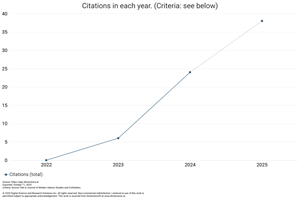Integration of Science and Islamic Values into Curriculum for Boarding School Students in the Modern Age
Study at An-Nur Hidayatullah Boarding School, Turen-Malang
DOI:
https://doi.org/10.59653/jmisc.v3i01.1441Keywords:
Synergy, Science, , Islamic Values, Project Learning, EcoenzymeAbstract
This article discusses the synergy between science and Islamic values in the curriculum of Islamic boarding schools in the modern era, focusing on implementing project-based learning approaches at the An-Nur Hidayatullah Islamic Boarding School in Turen, Malang. This study explores how project-based activities such as ecoenzymes manufacturing by An Nur Hidayatullah High School students can be understood and studied scientifically while integrating Islamic values into the learning process. Through this approach, students are invited to combine scientific knowledge related to making ecoenzymes with Islamic principles such as concern for the environment, social responsibility, and wise use of natural resources. This study shows that the application of project-based learning provides a practical understanding of scientific concepts and strengthens the formation of Islamic characters relevant to the challenges of the modern era. Thus, the synergy between science and Islamic values in Islamic boarding school education can create a harmonious relationship in educating the younger generation to become intelligent and noble individuals.
Downloads
References
’Adlan, A. A. H. (2023). Influence of Modernity on Society in Developing Countries. Journal of Modern Islamic Studies and Civilization, 2(01), 1–9. https://doi.org/10.59653/jmisc.v2i01.299
Ansori, M. (2021). Pengembangan Kurikulum Madrasah Di Pesantren. Munaddhomah: Jurnal Manajemen Pendidikan Islam, 1(1), 41–50. https://doi.org/10.31538/munaddhomah.v1i1.32
Anwar, M. S., Huda, M., & Maghfiroh, R. (2022). Integrasi Kurikulum Pesantren Dan Madrasah (Studi Kasus Di Pondok Pesantren Al-Ishlah Jenggawah Jember). Al-Tarbawi Al-Haditsah: Jurnal Pendidikan Islam, 7(2), 142. https://doi.org/10.24235/tarbawi.v7i2.12013
Budiyono, A. (2021). Konsep Kurikulum Terintegrasi. Ilmuna: Jurnal Studi Pendidikan Agama Islam, 3(1), 66–84. https://doi.org/10.54437/ilmuna.v3i1.253
Chanifudin, C., & Nuriyati, T. (2020). Integrasi Sains dan Islam dalam Pembelajaran. ASATIZA: Jurnal Pendidikan, 1(2), 212–229. https://doi.org/10.46963/asatiza.v1i2.77
Daulay, A. R., & Salminawati. (2022). Integrasi Ilmu Agama Dan Sains Terhadap Pendidikan. Journal Of Social Research, 1(3), 717–724.
Fakhruddin, U., Bahrudin, E., & Mujahidin, E. (2018). Konsep integrasi dalam sistem pembelajaran mata pelajaran umum di pesantren. Ta’dibuna: Jurnal Pendidikan Islam, 7(2), 214. https://doi.org/10.32832/tadibuna.v7i2.1394
Fakhrurrazi, F., Wasilah, N., & Jaya, H. (2023). Islam and Knowledge: Harmony between Sciences and Faith. Journal of Modern Islamic Studies and Civilization, 2(01 SE-Articles), 45–57. https://doi.org/10.59653/jmisc.v2i01.416
Firdausiyah, L., Nasa’i, I., & Bakar, M. Y. A. (2022). Sistem Evaluasi Pembelajaran Kurikulum Kepesantrenan Di Pondok Pesantren Darul ’Ulum Jombang. Jurnal Studi, Sosial Dan Ekonomi, 3(1), 10–19.
Gultom, F., Hernawaty, H., Brutu, H., & Karo-karo, S. (2022). PEMANFAATAN PUPUK EKOENZIM DALAM MENINGKATKAN PERTUMBUHAN DAN PRODUKSI TANAMAN BAWANG MERAH (Allium cepa L.). Jurnal Darma Agung, 30(1), 142. https://doi.org/10.46930/ojsuda.v30i1.1433
Hasibuan, S., Rodliyah, I., Thalhah, S. Z., Ratnaningsih, P. W., & E, A. A. M. S. (2022). Media penelitian kualitatif. In Jurnal EQUILIBRIUM (Vol. 5, Issue January).
Hopid, A. (2021). INTEGRASI ILMU DALAM PENDIDIKAN: Membaca Potensi Integrasi Sains dan Agama di Pondok Pesantren Mahasiswa UII Yogyakarta. ABHATS: Jurnal Islam Ulil Albab, 2(2), 97–114. https://doi.org/10.20885/abhats.vol2.iss2.art2
Khoiruddin, M. (2019). Integrasi Kurikulum Pesantren dan Perguruan Tinggi. Cendekia: Jurnal Kependidikan Dan Kemasyarakatan, 17(2), 219–234. https://doi.org/10.21154/cendekia.v17i2.1526
Kholish, A., & Wafa, M. C. A. (2022). Pendidikan Multikultural di Pondok Pesantren Tradisional dan Modern sebagai Upaya Menjaga Negara Kesatuan Republik Indonesia (Studi di Pondok Pesantren Asy Syamsuriyah Brebes). Jurnal Ilmu Pendidikan Dan Sains Islam Interdisipliner, 1(1), 1–12. https://doi.org/10.59944/jipsi.v1i1.1
Kulsum, U., Munirom, A., Sayuti, A., & Waluyo, B. (2024). MANAJEMEN KURIKULUM DALAM PENDIDIKAN ISLAM : INTEGRASI ILMU DUNIA DAN AKHIRAT. UNISAN JURNAL: JURNAL MANAJEMEN DAN PENDIDIKAN, 03(09), 22–33.
Kusumawati, I., & Nurfuadi. (2024). Integrasi Kurikulum Pesantren Dalam Kurikulum Nasional Pada Pondok Pesantren Modern. Sanskara Pendidikan Dan Pengajaran, 2(01), 1–7. https://doi.org/10.58812/spp.v2i01.293
Mukarom, Z., Hermansyah, Y., Karim, M., & ... (2023). Pendekatan Interdisipliner Dalam Pendidikan Islam: Menggabungkan Ilmu Pengetahuan Modern Dan Nilai-Nilai Keislaman. … Pendidikan …, 8(2).
Mundungningtias, L. (2022). Manajemen Integrasi Kurikulum Pesantren Dan Nasional Untuk Meningkatkan Mutu Lulusan Pesantren. Al-Afkar, Journal For Islamic Studies, 5(4), 323–331. https://doi.org/10.31943/afkarjournal.v5i4.378
Qadariyah, L., & Subhan, M. (2019). INTEGRASI KEILMUAN PESANTREN (Studi Korelasi Antara Ilmu Agama dan Ilmu Umum di Institut Ilmu Keislaman Annuqayah). Jurnal Pemikiran, Pendidikan Dan Penelitian Ke-Islaman P-ISSN, 5(1), 16–23. https://doi.org/10.31102/ahsana..5.1.2019.16-23
Supriatna, E. (2019). Islam dan Ilmu Pengetahuan. Jurnal Soshum Insentif, 2(1), 128–135. https://doi.org/10.36787/jsi.v2i1.106
Syafe’i, I. (2017). Mastuhu, 1994PONDOK PESANTREN: LEMBAGA PENDIDIKAN PEMBENTUKAN KARAKTER Imam. Al-Tadzkiyyah: Jurnal Pendidikan Islam, 8(I), 61–82. https://doi.org/https://dx.doi.org/10.24042/atjpi.v8i1.2097
Ugli, A. Z. Z., & Farxodjonova, N. (2024). Alikhantura Soguniy Role in State Administration in East Turkestan. Journal of Modern Islamic Studies and Civilization, 2(02), 128–132. https://doi.org/10.59653/jmisc.v2i02.540
Downloads
Published
How to Cite
Issue
Section
License
Copyright (c) 2025 Mar'atul Fitriayu Azizah, Lailatur Rohanita

This work is licensed under a Creative Commons Attribution-ShareAlike 4.0 International License.
Authors who publish with this journal agree to the following terms:
- Authors retain copyright and grant the journal right of first publication with the work simultaneously licensed under a Creative Commons Attribution-ShareAlike that allows others to share the work with an acknowledgement of the work's authorship and initial publication in this journal.
- Authors are able to enter into separate, additional contractual arrangements for the non-exclusive distribution of the journal's published version of the work (e.g., post it to an institutional repository or publish it in a book), with an acknowledgement of its initial publication in this journal.
- Authors are permitted and encouraged to post their work online (e.g., in institutional repositories or on their website) prior to and during the submission process, as it can lead to productive exchanges, as well as earlier and greater citation of published work (See The Effect of Open Access).
























